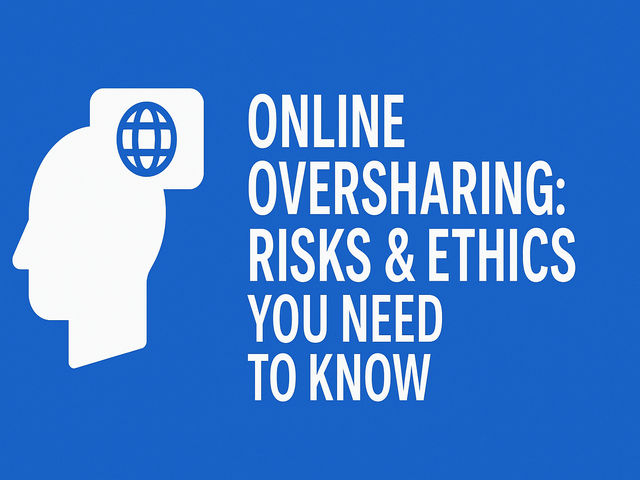Online Oversharing: Risks & Ethics You Need to Know

Sharing is second nature to us. We share photos of our holidays, tweet our ideas, check in on our location, and blog about our lives all with a finger click. But while sharing can help us bond with others, oversharing can leave us vulnerable to serious risks that we may not be aware of.
This blog delves into the ethics, risks, and unintended consequences of sharing too much online and provides practical action to help you maintain your privacy in a networked world.
Prefer watching instead of reading? Here’s a quick video guide
What Is Oversharing?
Oversharing is sharing too much personal information on social media or public websites sometimes unwittingly. This includes:
- Sharing your location in real-time
- Publishing your entire birthday, phone number, or home address
- Describing your personal relationships, family issues, or issues at work
- Posting photos that show sensitive information in the background (such as ID cards or computer screens)
- Describing your day-by-day routine in great detail
We overshare because we feel protected and in charge behind the screen. But the internet is more public and longer-lasting than we imagine.
Why People Overshare
There are lots of reasons why people overshare, including:
- Trying to connect or get approval
- Attempting to create a personal brand
- Thinking that their posts are only visible to friends or followers
- Thinking that nothing bad will ever occur to them ("It won't happen to me")
- Merely not understanding that something is sensitive
Such behavior is fostered by platforms that reward visibility and engagement. The more you post, the more likes, comments, and attention you receive.
But here's the trick once you put something on the Internet, it can go anywhere and hit folks you never meant to.
The Secret Dangers of Oversharing
Social Engineering and Scams
Thieves and spammers tend to exploit publicly available information to manipulate individuals into divulging additional information. Such is referred to as social engineering.
For instance, if you constantly post about your dog "Rocky," and that just so happens to be your password reset question, a hacker might figure it out. If you post where you work and then discuss your boss, someone might use that information to pretend to be your HR department in a phishing email.
Oversharing gives attackers context that enables them to craft a credible narrative rendering their scams more credible.
Identity Theft
When you post items like:
• Full name
• Birthdate
• Address
• School or workplace
• Family member names
…you’re giving away the building blocks of your identity. Criminals can use this information to open credit cards, apply for loans, or even access your medical records.
Even small details, when combined, can be used to impersonate you.
Stalking and Harassment
Real-time location tagging and check-ins expose you to physical stalking or harassment. Posting a photo while on vacation means you're sharing with the world that your home is unoccupied.
You're exposing your children's names, schools, or daily routines to risk as well.
Job and Reputation Damage
Many people have lost job offers or even been fired over what they posted online. Oversharing about your employer, colleagues, or work stress may seem harmless but can be considered a breach of professionalism or confidentiality.
Even years later, your old posts may resurface and hurt your reputation, especially if taken out of context.
Emotional Exploitation
Sharing emotional or vulnerable posts may get sympathy, but it may also get the wrong attention like manipulation, emotional abuse, or exploitation at the hands of strangers.
Predators online usually target individuals who appear lonely, insecure, or emotionally unstable.
The Ethical Aspect of Oversharing
Aside from personal danger, oversharing may have ethical implications:
Posting Others' Information Without Permission
Sharing photos or information about your friends, family, or coworkers even positively without their consent can intrude on their privacy. You could inadvertently expose:
- Your home address in a photo
- Their location in a tag
- Closed messages or chats
Remember to always ask: "Is this my story to share?"
Children and Digital Consent
Numerous parents share photos of their children from birth, establishing a digital presence for a person who has not provided consent.
These entries might innocently appear at first, but could embarrass, jeopardize, or haunt the child in the future.
We must consider whether it's right to disclose so much of someone else's life without his or her awareness or consent.
Data for Profit
Social media sites and advertisers harvest information from what you post to create profiles and show you ads. When you overshare, you're not only putting yourself out there you're giving food to a machine that makes money off of your life.
How to Remain Safe and Private on the Internet
You don't have to stop posting completely just post wisely. Try these tips:
Think Before You Post
Ask yourself:
- Could this expose too much?
- Can someone use this against me?
- Am I posting someone else's information without their permission?
If unsure, don't post.
Check Privacy Settings: Ensure your profiles are set to private, and only people you trust are able to view your posts. But keep in mind: "Private" doesn't necessarily mean "safe." Friends can still screenshot.
Don't Post Real-Time Updates: If you are traveling, wait until you return before posting photos. Avoid tagging your location while you are away.
Review Your Previous Posts: Scour your social media past and delete anything that's sensitive, offensive, or too personal.
Inform Yourself and Others: Discuss internet safety with your friends and family members. Educate children about oversharing at an early age.
Final Thoughts
In the current world, privacy is power and sharing too much gives that power away. What we do online can be used to benefit or harm us, today and tomorrow. Social media might make it simple to get connected and share ourselves, but it also requires us to be more responsible than ever.
Remember: Just because you can, doesn't mean you should.
The internet is permanent. Pick your words and your posts carefully.




